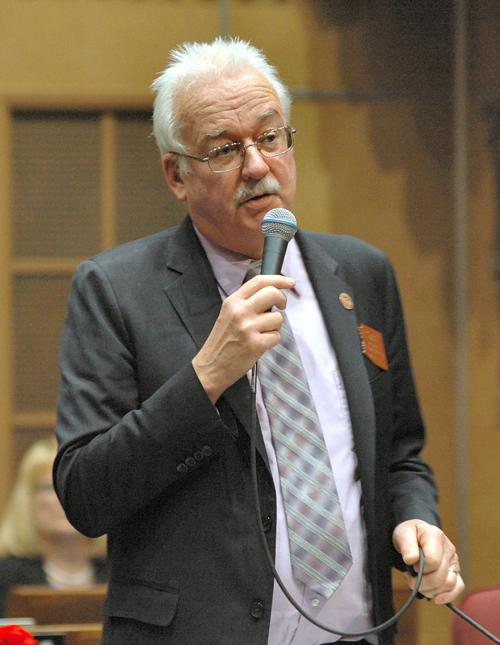A bid by a veteran lawmaker to protect Arizonans from ticket scalpers and their high prices could undermine research in the state into artificial intelligence.
And that’s assuming it’s even enforceable.
Sen. John Kavanagh, R-Fountain Hills, wants to make it a crime to use any computer or software that conceals its real identity “to simulate or impersonate the action of a human.” Violations would be a felony subjecting the owners or operators to a year in state prison.
What Kavanagh is trying to outlaw are computer “bots” that can log into sites and do things that it would normally take a human to do.
“I’m told that it’s a real issue with concert tickets and sporting event tickets,” he said, logging into computer sites the minute tickets go on sale and buying up all the tickets. Kavanagh said that can be done even if there are limits to individual sales, with computers quickly making multiple purchases.
“And then people who want to go to these concerts they wind up having to go to one of these storefronts or online sales places,” he said. “And they’re paying two, three times face value.”
Ken Colburn, CEO of Data Doctors Computer Services, questioned the need for such a law.
He said there are ways for concert promoters and sports teams to protect against people scarfing up lots of tickets, like having a limit on purchases. Colburn said multiple dial-ins can be thwarted with things like checking the IP address of the computer making the purchase.
But Colburn said his bigger concern is the unintended consequences of such a law.
“That basically eliminates some of the most progressive technology already in use by millions of companies,” he said.
“Half the time when you’re talking to somebody on a web site, those little chat boxes, you’re not talking to a human,” Colburn explained, with the computer on the other end programmed to respond to questions.
Kavanagh brushed that concern aside.
“Everybody knows this is not a human being,” he said. But Colburn said that may not be clear to anyone who opens an online chat window with a merchant or other company to ask questions about a product or service.
“They sure make it look like a human,” he said. “It’s got a picture there and everything.”
Nate Cardoza, senior staff attorney for the Electronic Frontier Foundation, said that’s just the beginning of the havoc SB 1011 would cause if enacted into law.
He said scientists are busy working on artificial intelligence, trying to design computers to not just react like humans but to be able to think and learn to the point where someone conversing with them online would have no way of knowing it was not a human on the other end.
In fact, that’s the basis for the Turing Test, an idea proposed by Alan Turing in the 1950s.
The idea is not to check the ability of computers to give the correct answer but to respond in the same way as a human.
By the very nature of the research, Cardoza said anyone running the test — and trying to fool someone on the other end — would be guilty of a crime.
“Without being able to run that test, AI research would evaporate,” he said. “The statute was written by someone who has zero background in technology.”
Tech issues aside, Cardoza said there’s also a legal problem with what Kavanagh is proposing.
“Programmers have First Amendment rights,” he said. “And code is speech.”
That’s not just his opinion.
In a 1999 ruling, the 9th Circuit Court of Appeals rejected arguments by the government that Daniel Bernstein, who had created an encryption system, needed a license to “export” his research paper, the source code and the instruction for how to use it. The judges ruled that effort by the government was an illegal prior restraint of his free speech.
Cardoza said the same logic would apply here to any effort to keep people from writing and using programs that would run afoul of Kavanagh’s legislation.
Arizona’s policy on scalpers is somewhat muddled.
The current law dates to 1989 when the National Football League said it would not consider having a Super Bowl in Arizona unless the state had an anti-scalping law.
Several lawmakers balked at any restrictions. But to placate the NFL they adopted as weak a law as they could: It bans the resale of tickets at a price higher than face value within 200 feet of the venue.
Kavanagh said he’s not interested in tightening up the laws or making scalping illegal.
“All I’m saying is, if companies want to sell tickets to individuals and not have these abusive companies buying up all the tickets and pissing off their customers, and the people who perform don’t want their fans ripped off, then should we simply make it illegal to impersonate a person on a computer,” he said.
Colburn said even if Kavanagh can get the measure approved, he doubts it would be enforceable.
“Does that mean that the web site that is being manipulated has to be hosted in Arizona?” he asked. “Does that mean the person who is committing the crime has to be in Arizona?”
That would seem to make a ticket reseller in another state out of reach of the Arizona law.
And Colburn said even a reseller in Arizona could use a “proxy server” in another state to make the transaction beyond the reach of state law.





